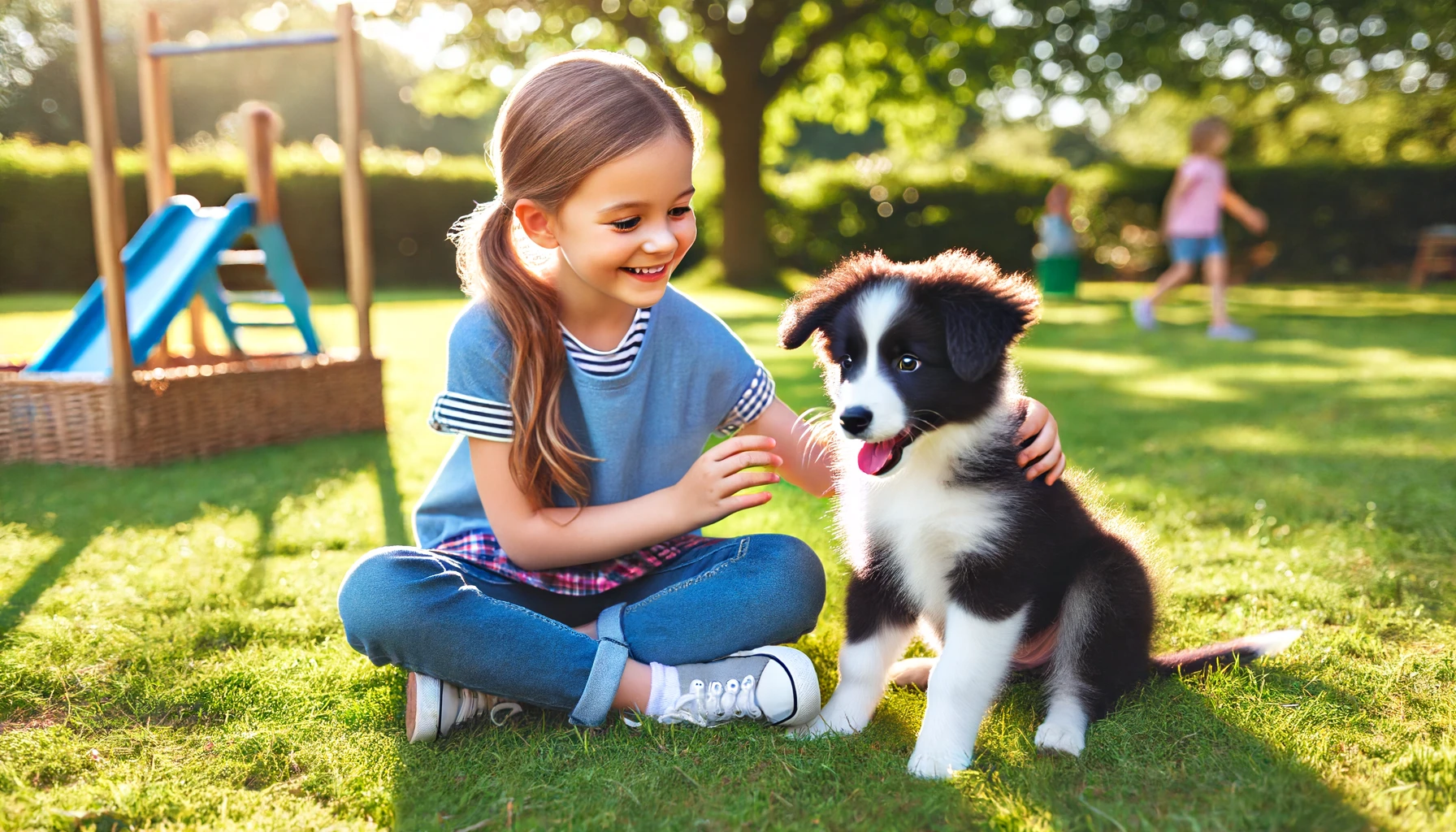Introduction Border Collie Puppy
Border Collie puppies are full of energy and love to play. They are very smart and can learn new tricks quickly. These puppies need lots of exercise every day. Taking them for walks and letting them run in the yard helps keep them happy. They also enjoy games like fetch and hide-and-seek. Spending time with them is very important.
Training a Border Collie puppy is fun but needs patience. Start with simple commands like “sit” and “stay.” Use treats and praise to reward them when they do well. Always be kind and patient, as they want to please you. Consistent training helps them learn better. These puppies are eager to learn and love to be challenged.
Brief Overview of the Border Collie Puppy Breed
Border Collies are renowned for their exceptional herding abilities and are often considered one of the most intelligent dog breeds. Originating from the border regions between Scotland and England, these dogs were bred to be hardworking and highly trainable. They possess a strong work ethic, incredible stamina, and a keen instinct for herding livestock. Their striking appearance, marked by a sleek coat and expressive eyes, adds to their appeal.
Importance of Raising a Happy and Healthy Border Collie Puppy
The early stages of a Border Collie’s life are crucial for their overall development. A happy and healthy puppy is likelier to grow into a well-adjusted, confident, and obedient adult dog. Proper care, socialization, and training during puppyhood lay the foundation for a strong bond between you and your furry companion. Addressing their physical and mental needs also ensures that your Border Collie thrives and enjoys a fulfilling life.
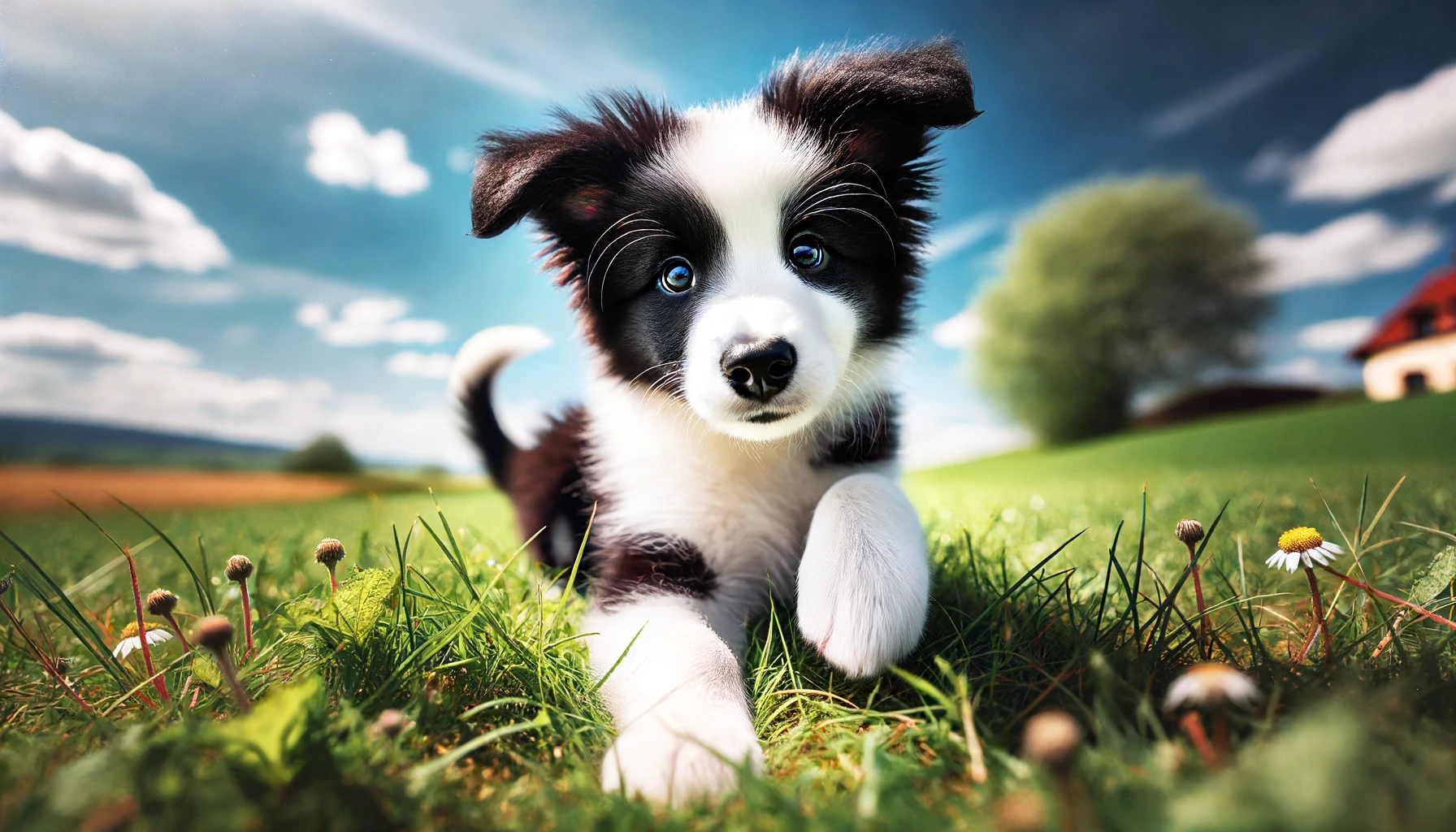
Border Collie Puppy Overview of the Tips to be Discussed
This blog will explore five powerful tips to help you raise a happy Border Collie puppy. These tips encompass the essential aspects of their care, from socialization and training to nutrition and health. By following these guidelines, you can provide the best possible start for your puppy and set them on the path to a joyful and healthy life.
- Proper Socialization: Learn how to introduce your puppy to new people, environments, and other dogs to ensure they grow up to be confident and well-behaved.
- Training and Mental Stimulation: Discover effective training methods and activities that keep your intelligent Border Collie mentally engaged and satisfied.
- Exercise and Physical Activity: Understand the exercise needs of this high-energy breed and how to balance physical activity with rest.
- Nutrition and Diet: Get tips on providing a balanced diet that supports your puppy’s growth and maintains their health.
- Health and Grooming: Learn about common health issues, the importance of regular veterinary care, and grooming practices to keep your puppy in top condition.
Understanding the Border Collie Breed
History and Origins
The Border Collie puppy breed has a rich history dating back to Scotland and England’s border regions. Developed in the rugged landscapes of these areas, Border Collies were bred specifically for their herding capabilities. Their name, “Border Collie,” reflects their geographic roots, with “Border” referring to the border region and “Collie” being a Scottish word for sheepdog.
Shepherds prized these dogs for their intelligence, work ethic, and unparalleled herding skills. Unlike other breeds that rely on brute force, Border Collie Puppy is known for controlling sheep with their intense gaze, often called “the eye.” This unique herding style, combined with their agility and endurance, made them indispensable working dogs in the agricultural communities of the British Isles.
Key Characteristics and Temperament
Border Collies are often celebrated as the epitome of canine intelligence. Thanks to their remarkable problem-solving abilities and quick learning capacity, they consistently rank at the top of lists for the smartest Border Collie Puppy breeds. Some key characteristics of Border Collies include:
- Intelligence: Border Collies are exceptionally bright and capable of learning complex commands and tasks.
- Energy: They are high-energy dogs that require ample physical and mental stimulation.
- Work Ethic: Bred for herding, they possess a strong drive to work and thrive when given tasks or jobs.
- Focus: Their intense focus and determination are evident in their herding behavior and during training.
- Affectionate Nature: Despite their working dog roots, Border Collies are also known for forming strong bonds with their owners and being very affectionate.
In terms of temperament, Border Collies are often described as alert, responsive, and eager to please. They can be reserved with strangers but are usually friendly once they get to know someone. Their high energy levels and need for mental stimulation mean they are best suited to active households where they can engage in plenty of physical and intellectual activities.
Why They Make Great Pets
Border Collies make excellent pets for the right owners. Here are some reasons why:
- Companionship: Their loyal and affectionate nature makes them wonderful companions. They thrive on interaction and enjoy being part of a family.
- Trainability: Their intelligence and eagerness to learn make them highly trainable. They excel in obedience training and can learn various tricks and commands.
- Activity Partners: Border Collies are ideal exercise partners for active individuals or families. They love running, hiking, agility training, and playing fetch.
- Protective Instincts: Their natural herding instincts can translate into a protective attitude towards their family, providing security.
- Versatility: Border Collies can adapt to various roles beyond herding, including therapy work, search and rescue, and competitive dog sports.
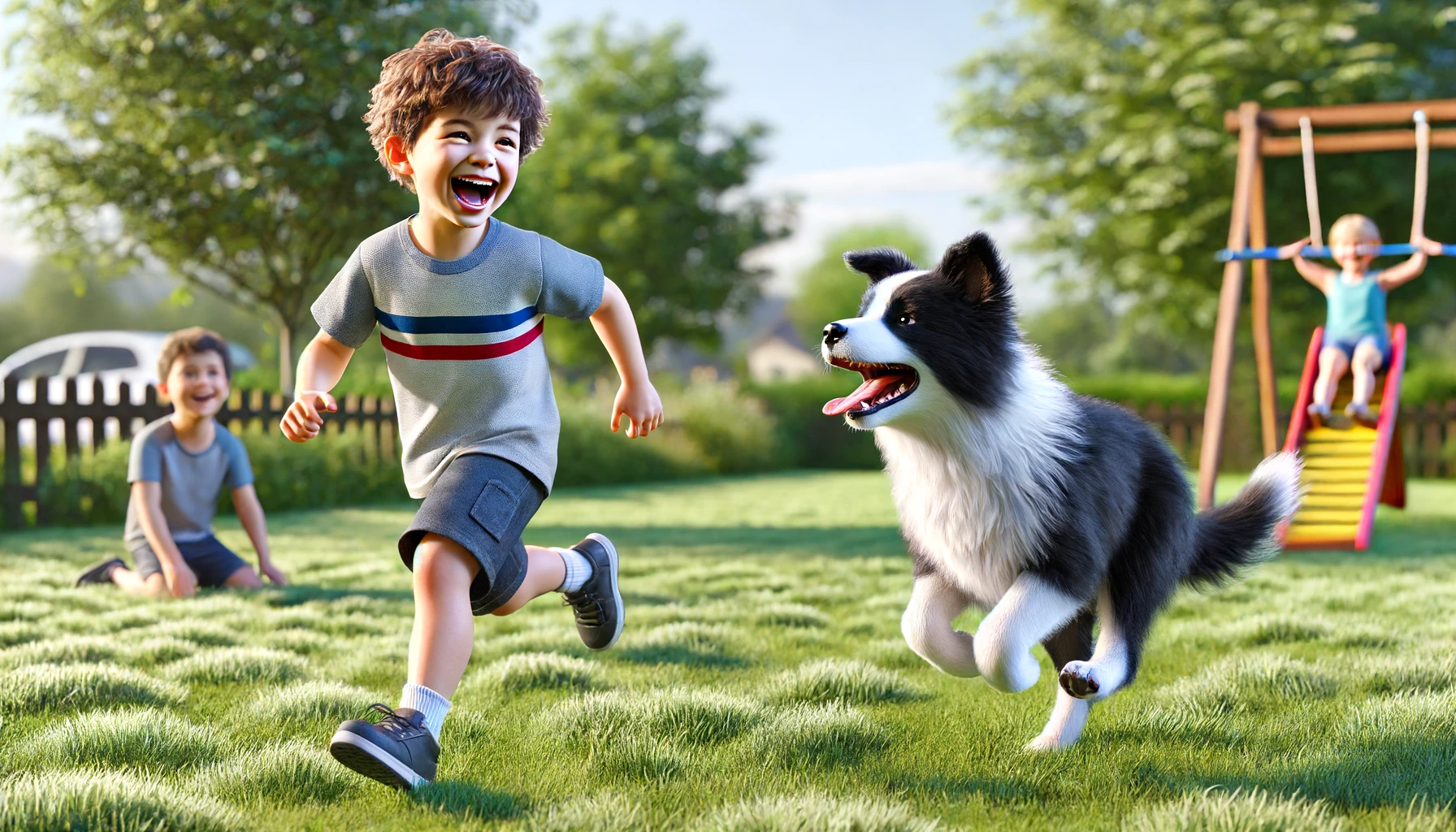
Tip 1: Proper Socialization Border Collie Puppy
Importance of Early Socialization
Early socialization is crucial for Border Collie puppies. During the first few months of life, puppies are particularly receptive to new experiences. Proper socialization helps ensure your puppy grows into a well-adjusted, confident, and friendly adult dog. Border Collies can become fearful, anxious, or aggressive in unfamiliar situations without adequate socialization. By exposing your puppy to various people, environments, and other dogs early on, you help them develop the skills they need to navigate the world calmly and happily.
How to Introduce Your Puppy to New People and Environments
- Start Slowly: Begin with gentle, positive experiences. Introduce your puppy to new people in a calm, controlled setting. Avoid overwhelming them with too many new faces at once.
- Positive Reinforcement: Use treats, praise, and affection to create positive associations with new people and environments. Reward your puppy for calm and friendly behavior.
- Varied Experiences: Expose your puppy to different environments, such as parks, streets, and pet-friendly stores. Let them experience various sounds, sights, and smells.
- Controlled Exposure: Gradually increase the level of exposure. Start with quieter environments and work up to busier, more stimulating places.
- Puppy Classes: Enroll your puppy in a reputable puppy socialization class. These classes provide a safe environment for puppies to interact with other dogs and people under the guidance of a professional trainer.
- Handling Exercises: Gently handle your puppy to get them used to being touched. This includes touching their paws, ears, and mouth. This helps them become comfortable with grooming and veterinary exams.
Tips for Socializing with Other Dogs
- Choose the Right Dogs: Start with calm, friendly dogs known to be good with puppies. Avoid dogs that are overly dominant or aggressive.
- Controlled Meetings: Arrange playdates in controlled environments. Keep the initial interactions short and positive. Gradually increase the duration as your puppy becomes more comfortable.
- Supervision: Always supervise interactions with other dogs. Watch for signs of stress or aggression, such as growling, snapping, or excessive barking. Intervene if necessary to ensure a positive experience.
- Group Activities: Once your puppy is comfortable with one-on-one interactions, participate in group activities, such as puppy playgroups or dog parks. This helps them learn to play and socialize in a group setting.
- Leash Introductions: Keep both dogs on a leash when introducing your puppy to another dog on a walk. Allow them to sniff each other briefly and then continue the walk. This helps prevent overstimulation and potential conflicts.
- Reward Good Behavior: Use treats and praise to reinforce positive interactions with other dogs. Reward your puppy for calm, friendly behavior during playdates and walks.
Tip 2: Training and Mental Stimulation Border Collie Puppy
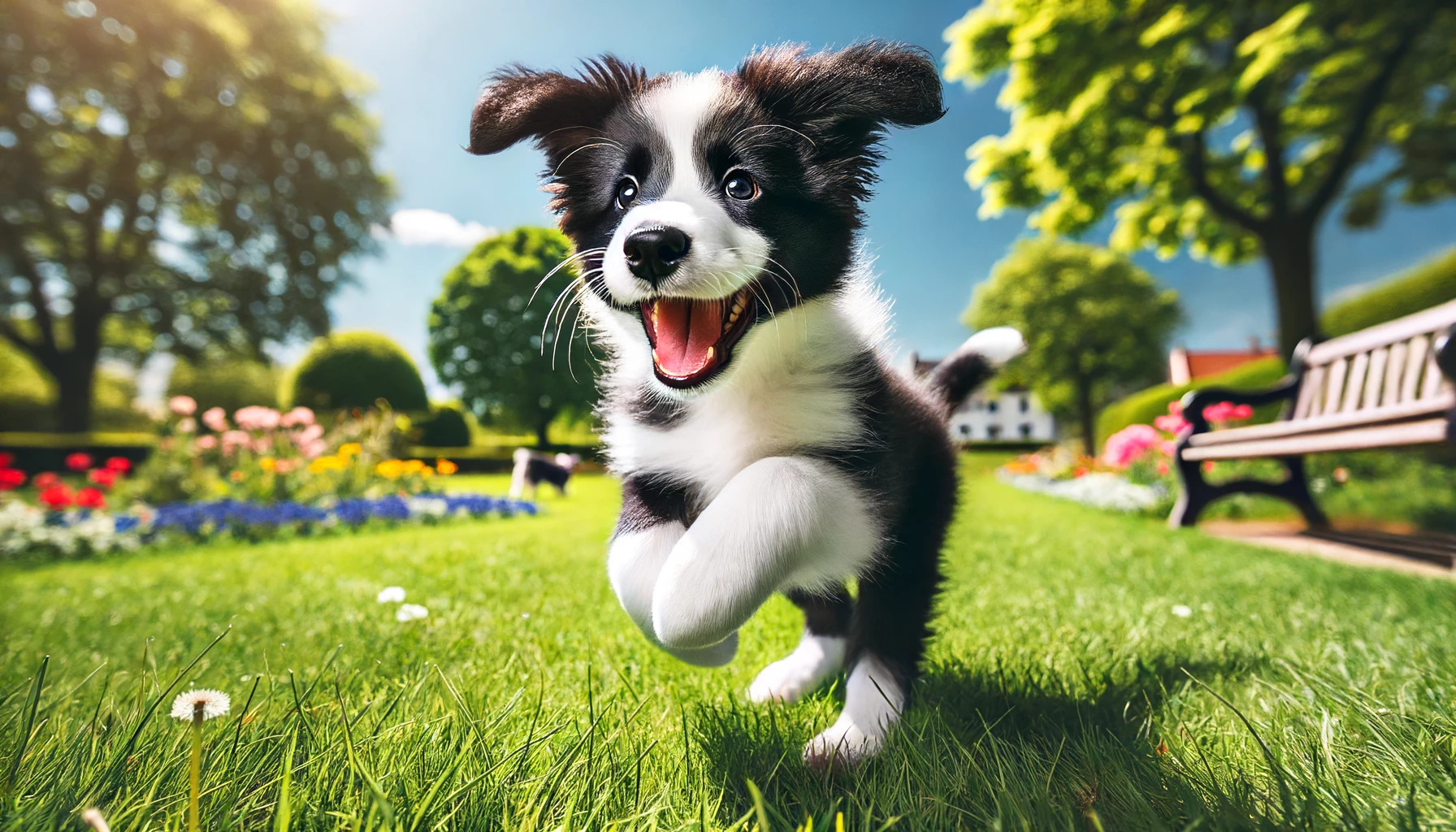
The Intelligence and Trainability of Border Collies
Border Collies are widely recognized as one of the most intelligent dog breeds. Their sharp minds and eagerness to learn make them highly trainable and capable of mastering various commands and tasks. This intelligence, however, also means that they require consistent mental stimulation to stay happy and well-behaved. Border Collies can become bored without proper training and mental engagement, leading to undesirable behaviors such as excessive barking, chewing, or digging.
Effective Training Methods
- Positive Reinforcement: Use positive reinforcement techniques, such as treats, praise, and toys, to reward desired behaviors. This approach encourages your Border Collie to repeat the behaviors you want to see.
- Consistency: Be consistent with your commands and expectations. Border Collies quickly learn patterns, so consistency helps them understand what is expected of them.
- Short, Frequent Sessions: Keep training sessions short and frequent to maintain your puppy’s attention and prevent them from becoming overwhelmed. Aim for sessions of 5-10 minutes, multiple times a day.
- Clear Commands: Use clear, concise commands and avoid repeating them multiple times. For example, use “sit” rather than “sit down” or “please sit.”
- Early Socialization: Integrate socialization with training. Expose your puppy to different environments, people, and other dogs during training sessions to help them become well-rounded.
- Obedience Classes: Enroll your Border Collie in obedience classes. These classes provide structured learning environments and help reinforce your training efforts.
- Clicker Training: Clicker training can be particularly effective with Border Collies. The clicker provides a distinct sound that marks the exact moment your dog performs the desired behavior, followed by a reward.
Ideas for Mental Stimulation and Enrichment Activities
- Puzzle Toys: Provide puzzle toys that challenge your Border Collie’s problem-solving skills. Toys that dispense treats when manipulated correctly are especially engaging.
- Interactive Games: Play interactive games like hide-and-seek or fetch. These games require your dog to use their brain and body.
- Training Drills: Regularly practice training drills, including advanced commands and tricks. Teaching new tricks not only reinforces obedience but also provides mental stimulation.
- Agility Training: Set up a basic agility course or attend agility classes in your backyard. Agility training combines physical exercise with mental challenges, making it perfect for Border Collies.
- Scent Work: Engage your dog in scent work by hiding treats or toys around the house and encouraging them to find them. This taps into their natural hunting instincts and provides mental stimulation.
- Interactive Feeders: Use interactive feeders or treat-dispensing toys during mealtime. This slows down their eating and provides an additional mental challenge.
- Advanced Obedience Training: Move beyond basic commands and teach advanced obedience skills, such as recall, stay, and complex tricks. Border Collies thrive on learning new and challenging tasks.
- Social Activities: Arrange playdates with other dogs or take your Border Collie to doggy daycare. Social interactions provide mental and physical stimulation.
- Daily Walks with Challenges: During daily walks, introduce challenges like walking over different surfaces, navigating obstacles, or practicing commands in different environments.
- Interactive Playtime: Spend quality time playing interactive games with your Border Collie, such as tug-of-war, frisbee, or flyball. These activities provide both mental and physical exercise.
Tip 3: Exercise and Physical Activity Border Collie Puppy
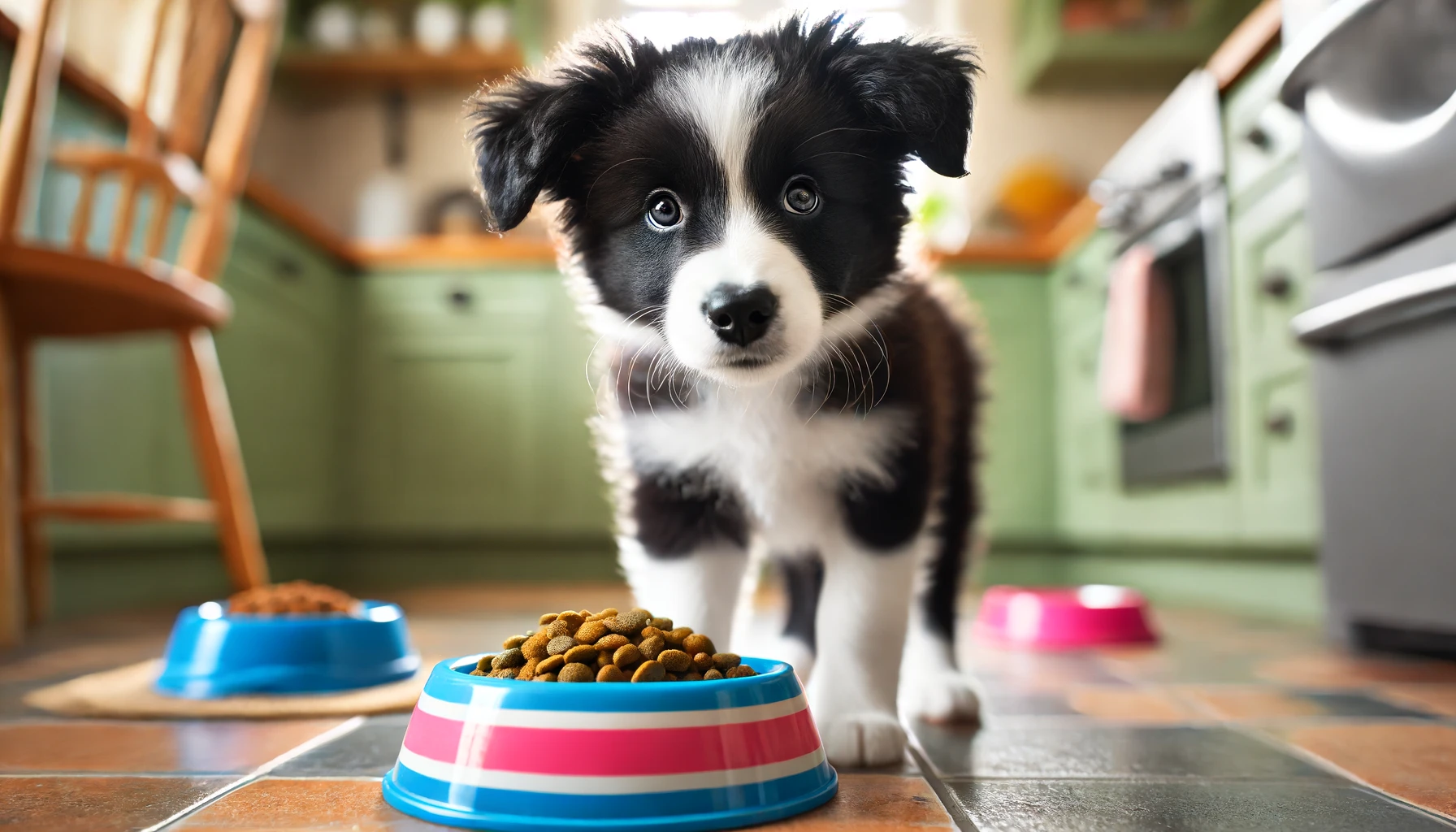
Exercise Needs of a Border Collie Puppy
Border Collies are renowned for their high energy levels and need for regular exercise. As puppies, they have boundless energy and require ample opportunities to burn it off to prevent boredom and destructive behaviors. Daily exercise is essential for physical health, mental well-being, and happiness.
Types of Physical Activities and Exercises
- Daily Walks: Take your Border Collie puppy for multiple walks each day. Aim for at least 30 minutes to 1 hour of walking daily, divided into shorter sessions to accommodate their growing bodies and attention spans.
- Running and Jogging: Border Collies make excellent running or jogging companions once they are old enough to handle sustained exercise. Start with shorter distances and gradually increase the intensity and duration as your puppy grows.
- Fetch and Retrieval Games: Engage your puppy in fetch or retrieval games using a ball, frisbee, or toy. This provides physical exercise and taps into their natural herding instincts and mental stimulation.
- Agility Training: Set up a backyard agility course or attend agility classes with your puppy. Agility training provides both physical exercise and mental stimulation as your puppy navigates obstacles and learns new skills.
- Swimming: Introduce your puppy to water gradually and supervise them closely, but swimming can be an excellent low-impact exercise for Border Collies, especially during hot weather.
- Hiking and Nature Walks: Take your puppy on hikes or nature walks in dog-friendly areas. These outings provide opportunities for exploration, sensory stimulation, and physical exercise in a natural setting.
- Interactive Toys: Use interactive toys like puzzle feeders or treat-dispensing balls to provide mental and physical stimulation during indoor playtime.
Balancing Exercise with Relaxation
- Scheduled Exercise: Establish a regular exercise routine for your Border Collie puppy, but be mindful not to overdo it, especially during their rapid growth phase. Balance high-energy activities with periods of rest.
- Watch for Signs of Fatigue: Pay attention to your puppy’s body language and energy levels during exercise. Signs of fatigue or overheating include excessive panting, lagging, or reluctance to continue.
- Provide Adequate Rest: Ensure your puppy has access to a comfortable and quiet space to rest and recharge after exercise. Provide a cozy bed or crate where they can retreat when they need downtime.
- Hydration: Keep your puppy hydrated during exercise by providing access to fresh water before, during, and after physical activity, especially on hot days.
- Avoid Overexertion: Avoid exercising your puppy in extreme weather conditions, such as excessive heat or cold. Adjust the intensity and duration of exercise based on your puppy’s age, fitness level, and individual needs.
- Consult Your Veterinarian: Consult with your veterinarian to develop a tailored exercise plan that meets your Border Collie puppy’s needs and considers any health concerns or restrictions.

Tip 4: Nutrition and Diet Border Collie Puppy
Importance of a Balanced Diet for a Growing Puppy
Proper nutrition is essential for the health and well-being of your Border Collie puppy, especially during their rapid growth and development stages. A balanced diet provides the nutrients, vitamins, and minerals to support healthy bone and muscle development, optimal organ function, and a strong immune system. Feeding your puppy a high-quality diet tailored to their specific nutritional needs is key to ensuring they grow into a healthy and happy adult dog.
Recommended Foods and Feeding Schedule
- High-Quality Puppy Food: Choose high-quality food for a large-breed Border Collie Puppy. Look for foods that meet the Association of American Feed Control Officials (AAFCO) standards and are designed to support growth and development.
- Protein-Rich Diet: Border Collie puppies benefit from a diet rich in high-quality animal proteins, such as chicken, turkey, beef, or fish. Protein is essential for muscle growth and repair.
- Balanced Nutrients: Ensure your puppy’s diet includes protein, carbohydrates, fats, vitamins, and minerals. Consult your veterinarian to determine the appropriate nutrient ratios for your puppy’s needs.
- Feeding Schedule: Establish a regular feeding schedule with set mealtimes. Most puppies do well with three meals a day until they are around six months old, then, you can transition to two meals a day. Avoid free-feeding to prevent overeating and weight gain.
- Monitor Growth: Keep track of your Border Collie Puppy’s growth and weight gain to ensure they grow healthy. Your veterinarian can guide what constitutes a healthy weight for your puppy’s age and breed.
- Hydration: Always provide access to clean, fresh water throughout the day to keep your puppy hydrated, especially during hot weather or after physical activity.
- Treats in Moderation: Limit the number of treats and table scraps your puppy receives to prevent nutritional imbalances and excess calorie intake. Opt for healthy, low-calorie treats or use small pieces of their regular kibble as rewards during training.
Tips for Maintaining a Healthy Weight
- Portion Control: Carefully measure your Border Collie Puppy food portions to prevent overfeeding. Follow the food manufacturer’s feeding guidelines based on your puppy’s age, weight, and activity level.
- Regular Exercise: Ensure your Border Collie Puppy gets plenty of regular exercise to burn off excess calories and maintain a healthy weight. Regular walks, playtime, and interactive games are essential for keeping your puppy fit and active.
- Avoid Table Scraps: Resist the temptation to feed your Border Collie Puppy table scraps or human food, as these can contribute to weight gain and nutritional imbalances.
- Monitor Body Condition: Regularly assess your puppy’s body condition by feeling their ribs and observing their overall body shape. Your Border Collie Puppy should have a slight fat covering over their ribs but not be overweight or underweight.
- Consult Your Veterinarian: If you have concerns about your puppy’s weight or nutritional needs, consult your veterinarian. They can provide personalized recommendations and guidance based on your puppy’s age, breed, and health status.
Tip 5: Health and Grooming Border Collie Puppy
Common Health Issues in Border Collies
While Border Collies are generally a healthy breed, like all dogs, they can be prone to certain health issues. Knowing these common conditions can help you monitor your puppy’s health and seek prompt veterinary care. Some common health issues in Border Collies include:
- Hip Dysplasia: A hereditary condition where the hip joint doesn’t develop properly, leading to arthritis and mobility issues.
- Collie Eye Anomaly (CEA): A genetic eye disorder that can cause vision impairment or blindness in severe cases.
- Epilepsy: Border Collies may be predisposed to epilepsy, a neurological disorder characterized by recurrent seizures.
- Allergies: Some Border Collies may develop allergies to environmental allergens, food ingredients, or flea bites, leading to skin irritation and itching.
- Osteochondritis Dissecans (OCD): A developmental joint disorder that can cause lameness and pain, particularly in the elbows or shoulders.
- Deafness: Border Collies may be susceptible to congenital deafness, which can be present at birth or develop later in life.
Regular Veterinary Check-ups and Vaccinations
- Routine Examinations: Schedule regular veterinary check-ups for your Border Collie puppy, ideally every 6-12 months, to monitor their overall health, growth, and development.
- Vaccinations: Follow your veterinarian’s recommended vaccination schedule to protect your puppy against common infectious diseases, such as parvovirus, distemper, and rabies.
- Parasite Prevention: Keep your puppy up to date on parasite prevention, including flea, tick, and heartworm prevention, to protect against external and internal parasites.
- Dental Care: Maintain good dental hygiene by brushing your puppy’s teeth regularly and providing dental chews or toys to help prevent tartar buildup and gum disease.
- Spaying or Neutering: Discuss the appropriate timing for spaying or neutering your Border Collie puppy with your veterinarian. Spaying or neutering can help prevent unwanted behaviors and certain health issues.
Grooming Tips to Keep Your Puppy Looking and Feeling Great
- Regular Brushing: Regularly brush your puppy’s coat to remove loose hair, prevent matting, and distribute natural oils. Border Collies have a dense double coat that requires regular grooming, especially during shedding seasons.
- Bathing: Bathe your puppy using a mild dog shampoo formulated for their coat type. Avoid bathing too frequently, as it can strip the coat of natural oils and lead to dry skin.
- Ear Cleaning: Regularly clean your puppy’s ears to remove dirt, wax, and debris. Use a gentle ear-cleaning solution recommended by your veterinarian, and avoid inserting anything into the ear canal.
- Nail Trimming: Keep your puppy’s nails trimmed to a comfortable length to prevent overgrowth and reduce the risk of injury or discomfort. Use dog nail clippers or a grinder to trim the nails carefully, avoiding the quick.
- Dental Care: Incorporate dental care into your puppy’s grooming routine by brushing their teeth regularly and providing dental treats or toys to help remove plaque and tartar.
- Eye Care: Monitor your puppy’s eyes for any signs of redness, discharge, or irritation. Clean the area around their eyes with a damp cloth to remove tear stains and debris.
- Anal Gland Expression: Check your puppy’s anal glands periodically for signs of impaction or infection. If necessary, consult your veterinarian or a professional groomer for assistance with anal gland expression.
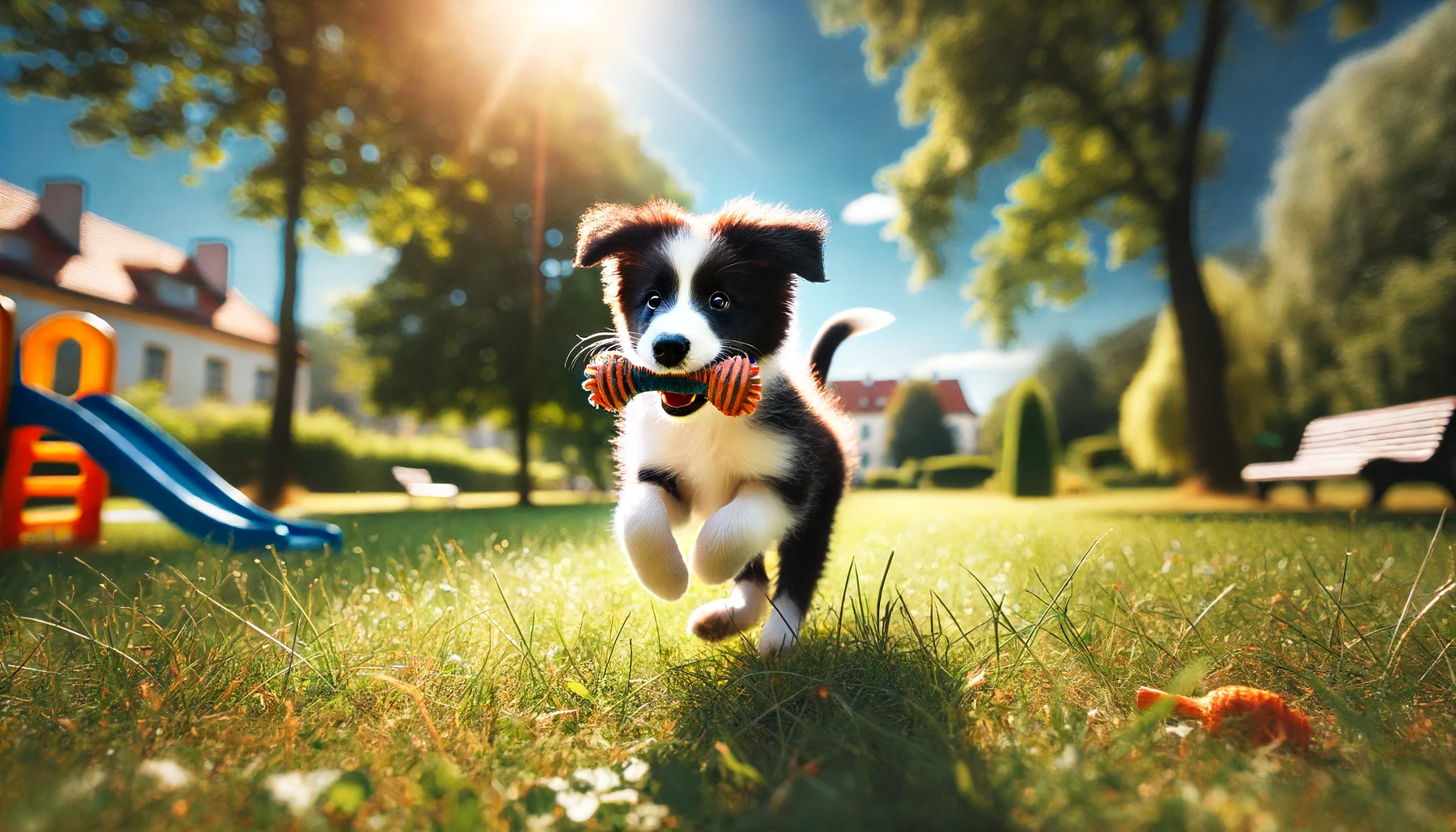
Building a Strong Bond
The Role of Positive Reinforcement and Affection
Positive reinforcement and affection are fundamental elements in building a strong bond with your Border Collie puppy. These methods enhance obedience and cooperation and foster trust, confidence, and mutual respect between you and your puppy. Here’s how you can incorporate positive reinforcement and affection into your interactions:
- Reward-Based Training: Use treats, praise, toys, and affection as rewards to reinforce desired behaviors, such as sitting, staying, or coming when called. Positive reinforcement motivates your puppy to repeat these behaviors and strengthens your bond through shared experiences of success and reward.
- Consistent Encouragement: Offer verbal praise, gentle petting, and enthusiastic encouragement during training sessions and daily interactions. Your puppy will respond positively to your enthusiasm and encouragement, strengthening the bond between you.
- Quality Time Together: Spend quality time engaging in activities your puppy enjoys, such as playtime, walks, training sessions, and cuddling. This dedicated time together builds trust, deepens your connection, and creates cherished memories.
- Physical Affection: Show your puppy affection through gentle petting, belly rubs, and cuddling sessions. Physical touch is a powerful way to communicate love and affection and strengthen the bond between you and your puppy.
- Understanding Body Language: Learn to understand your puppy’s body language and respond appropriately to their cues. Recognizing signs of stress, fear, or discomfort allows you to provide comfort and support, reinforcing your role as a caring and attentive companion.
Activities to Strengthen Your Bond with Your Puppy
- Training Sessions: Use training sessions to bond with your puppy while teaching them new skills and commands. Positive, reward-based training builds trust, enhances communication, and strengthens your partnership.
- Interactive Play: Engage in interactive games and playtime with your puppy, such as fetch, tug-of-war, hide-and-seek, or interactive toy games. These activities promote bonding, physical exercise, and mental stimulation while fostering a sense of fun and companionship.
- Exploration and Adventure: Take your puppy on walks, hikes, or outings to explore new environments together. Exploring the world side by side strengthens your bond, builds confidence, and creates shared experiences.
- Routine Activities: Incorporate your puppy into your daily routines, such as mealtime, grooming sessions, and relaxation time. Consistent routines provide stability, predictability, and opportunities for bonding throughout the day.
- Training Challenges: Set training challenges or goals together, such as mastering a new trick, completing an agility course, or participating in canine sports. Working towards common goals strengthens your teamwork and deepens your bond.
Creating a Loving and Supportive Home Environment
- Positive Atmosphere: Create a nurturing home environment for your puppy by providing love, attention, and security. Your puppy will thrive in an environment where they feel safe, loved, and valued.
- Clear Boundaries: Establish clear boundaries and expectations for your puppy’s behavior, using positive reinforcement to encourage desired behaviors and gentle redirection to discourage unwanted behaviors. Consistent boundaries promote a harmonious and respectful relationship.
- Comfort and Safety: Ensure your puppy has access to comfortable bedding, safe toys, and a designated space to retreat when they need privacy or relaxation. Providing for your puppy’s physical and emotional needs fosters a sense of security and trust.
- Quality Time Together: Make time to bond with your puppy daily, even amidst busy schedules. Whether it’s a morning cuddle session, an evening walk, or playtime in the backyard, prioritize spending quality time together to strengthen your bond and deepen your connection.
- Patience and Understanding: Be patient as your puppy learns and grows. Building a strong bond takes time, consistency, and patience, but the rewards of a deep and lasting connection are immeasurable.
Conclusion Border Collie Puppy
Border Collie puppies are smart and full of energy. To keep them happy, give them lots of exercise. Take them for walks and let them run in the yard. They also love to play games like fetch and tug-of-war. Playing helps them stay fit and happy. Make sure to spend time with them every day.
Training is very important for Border Collie puppies. Start with simple commands like “sit” and “stay.” Use treats and praise to reward good behavior. Be patient and kind, as they are eager to learn. Consistent training will help them become well-behaved dogs. Remember, they are smart and love to please you.
FAQs about Border Collie Puppies
Q: How much exercise does a Border Collie puppy need?
Border Collie puppies need at least an hour of exercise daily. They love running, playing fetch, and exploring the outdoors. This keeps them healthy and happy.
Q: What is the best way to train a Border Collie puppy?
Start with basic commands like “sit” and “stay.” Use treats and praise to reward good behavior. Be consistent and patient, as Border Collies are smart and eager to learn.
Q: What should I feed my Border Collie puppy?
Feed your Border Collie puppy high-quality puppy food. Follow the feeding guidelines on the package and adjust as they grow. Always provide fresh water.
Q: How can I keep my Border Collie puppy entertained?
Border Collie Puppy loves games and puzzles. Toys that challenge their mind, like treat-dispensing toys, are great. Playing fetch and teaching new tricks also keep them busy.
Q: Are Border Collie puppies good with kids?
Yes, Border Collie Puppy is usually good with kids. They are friendly and energetic. Supervise playtime to ensure both the puppy and kids are safe.
Q: How often should I groom my Border Collie puppy?
Brush your Border Collie puppy at least once a week to keep their coat healthy. Regular brushing helps reduce shedding and keeps their fur smooth.
Q: What health issues are common in Border Collie puppies?
Border Collie puppies can have health issues like hip dysplasia and eye problems. Regular vet check-ups and a healthy diet can help prevent these issues. Always ask your vet for advice on keeping your puppy healthy.
